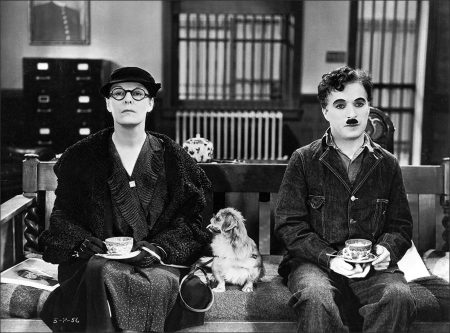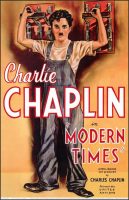Modern Times movie storyline. Chaplin’s last ‘silent’ film, filled with sound effects, was made when everyone else was making talkies. Charlie turns against modern society, the machine age, (The use of sound in films ?) and progress. Firstly we see him frantically trying to keep up with a production line, tightening bolts.
He is selected for an experiment with an automatic feeding machine, but various mishaps leads his boss to believe he has gone mad, and Charlie is sent to a mental hospital – When he gets out, he is mistaken for a communist while waving a red flag, sent to jail, foils a jailbreak, and is let out again. We follow Charlie through many more escapades before the film is out.
In Modern Times (1936), the still-silent Tramp, with his familiar small Derby hat, mustache, large boots, baggy pants, tight jacket and cane makes his last screen appearance. Filmed between 1932 and 1936, it was directed, written, scored, and produced by Chaplin himself – and he also starred in his own ‘one-man show’ with his current wife and kindred spirit Paulette Goddard. This was Chaplin’s first film after his successful City Lights (1931), released nine years after the advent of ‘talkies.’
This social protest film is Charlie Chaplin’s final stand against the synchronized sound film – and it is also his last full-length “silent film” – although it must be noted that it is a quasi-silent film. There is no traditional, synchronized voice dialogue in the film – but voices and sounds do emanate from machines (e.g., the feeding machine), television screens (i.e., the Big Brother screen – pre-dating George Orwell’s book 1984, written/published in 1949), and Chaplin’s actual voice is heard singing an imaginary, nonsense song of gibberish. Special sound effects and an original musical score (by composer Chaplin, including various musical themes from “Hallelujah, I’m a Bum,” “Prisoner’s Song,” “How Dry I Am,” and “In the Evening By the Moonlight”) enhance the pantomime.
Set in the 1930s during the Great Depression era, the film’s main concerns (and those of the oppressed Tramp) echo those of millions of people at the time – unemployment, poverty, and hunger. It has a number of wonderfully inventive and memorable routines and scenes that proclaim the frustrating struggle by proletarian man against the dehumanizing effects of the machine in the Industrial Age (at the time of Henry Ford’s assembly line), and various social institutions.
Modern Times (1936)
Directed by: Charles Chaplin
Starring: Charles Chaplin, Paulette Goddard, Henry Bergman, Tiny Sandford, Chester Conklin, Hank Mann, Stanley Blystone, Al Ernest Garcia, Richard Alexander, Cecil Reynolds, Mira McKinney
Screenplay by: Charles Chaplin
Production Design by: Charles D. Hall
Cinematography by: Ira H. Morgan, Roland Totheroh
Film Editing by: Charles Chaplin, Willard Nico
Set Decoration by: J. Russell Spencer
Art Direction by: J. Russell Spencer
Music by: Charles Chaplin
Distributed by: United Artists
Release Date: February 5, 1936
Views: 170

